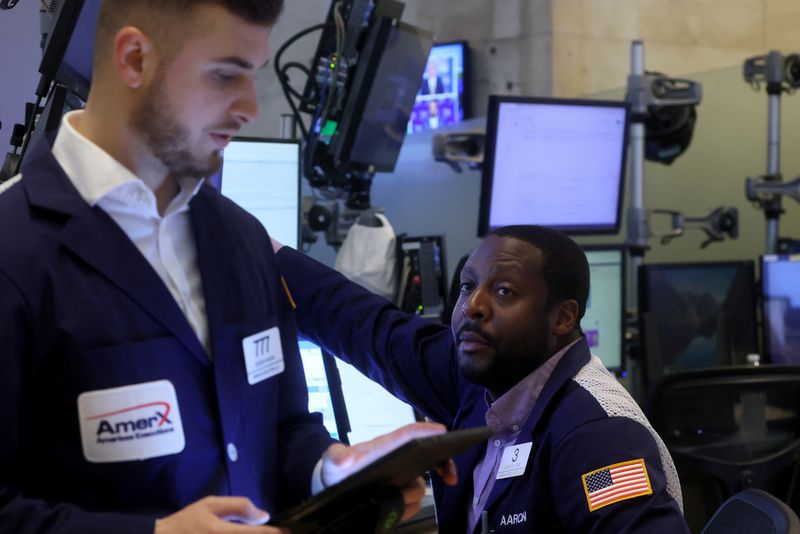By Echo Wang
(Reuters) - Wall Street closed lower on Friday after a report of slowing U.S. labor market growth, and all three major indexes posted weekly losses as investors braced for more possible downside surprises a day after disappointing earnings from Apple (NASDAQ:AAPL).
Apple's shares AAPL.O fell 4.8%, its biggest daily percentage decline since Sept. 29, 2022 that dented the S&P 500 by about 16 points the day after the iPhone maker forecast a continued slide in sales.
A partial counterweight to Apple for the S&P 500 and Nasdaq was Amazon.com (NASDAQ:AMZN). Its shares AMZN.O rose 8.3% the day after the online retailer issued an upbeat third-quarter outlook. Amazon's rise were an 11-point positive for the S&P 500.
"Those big bellwether companies really have the potential to cause investor jitters even though overall the trajectory and direction of both the economy and corporate earnings seems to be positive moving into August." Said Greg Bassuk, chief executive officer of AXS Investments in New York.
The trading session was choppy, with the indexes rising in the morning, then wavering before turning negative.
On the bond market, the yield on the 10-year U.S. Treasury edged lower in afternoon trading.
"There's still a lot of uncertainty around geopolitical concerns, Ukraine war, (and) China issues”, said Bassuk. He said Friday's decline was "more about investors resetting and positioning for potential downside surprises."
The Labor Department reported that U.S. employers added 187,000 jobs in July. Data for June additions was revised lower to 185,000 jobs, from 209,000 reported previously.
Average hourly earnings rose 0.4% in July, unchanged from the previous month, exceeding expectations, taking the year-on-year increase in wages to 4.4%.
The yield on the 10-year benchmark Treasury note US10YT=RR dipped after the jobs data, partly boosting some megacap stocks.
Shares of other big tech companies, Microsoft (NASDAQ:MSFT) MSFT.O and Snowflake SNOW.N rose 0.3% and 3.5% respectively after Amazon's cloud business segment beat sales estimates.
The Dow Jones Industrial Average .DJI fell 150.27 points, or 0.43%, to 35,065.62, the S&P 500 .SPX lost 23.86 points, or 0.53%, to 4,478.03 and the Nasdaq Composite .IXIC dropped 45.18 points, or 0.32%, to 13,914.54.
The weekly percentage declines for the S&P and Nasdaq were the biggest since March, with some investors taking profits after five months of gains due to economic data, disappointing earnings and rising Treasury yields.
Of the 422 companies in the S&P 500 that have reported quarterly earnings as of Friday, 79.1% have surpassed autonomous expectations, according to Refinitiv data.
Carl Icahn-owned investment firm Icahn Enterprises IEP.O shed 23.3%. The company halved its quarterly payout, months after short-seller Hindenburg Research accused it of operating a "Ponzi-like" structure to pay dividends.
Fortinet FTNT.O tumbled 25.1% after the cybersecurity firm cut its annual revenue forecast as spending from enterprise clients remained tight amid a turbulent economy.
Shares of Tupperware TUP.N, known for its plastic airtight storage containers and bowls, rallied 35.5% after the company finalized an agreement with its lenders to restructure its debt obligations in an effort to turn around the business.
Amgen (NASDAQ:AMGN) AMGN.O added 5.5% after it reported a higher quarterly profit on strong sales of its cholesterol, osteoporosis and other drugs.
DraftKings' DKNG.O shares rose 5.8% after the sports-betting firm raised its fiscal year 2023 revenue outlook.
Volume on U.S. exchanges was 11.39 billion shares, compared with the 10.87 billion average for the full session over the last 20 trading days.

Advancing issues outnumbered declining ones on the NYSE by a 1.22-to-1 ratio; on Nasdaq, a 1.14-to-1 ratio favored decliners.
The S&P 500 posted 19 new 52-week highs and 11 new lows; the Nasdaq Composite recorded 54 new highs and 91 new lows.